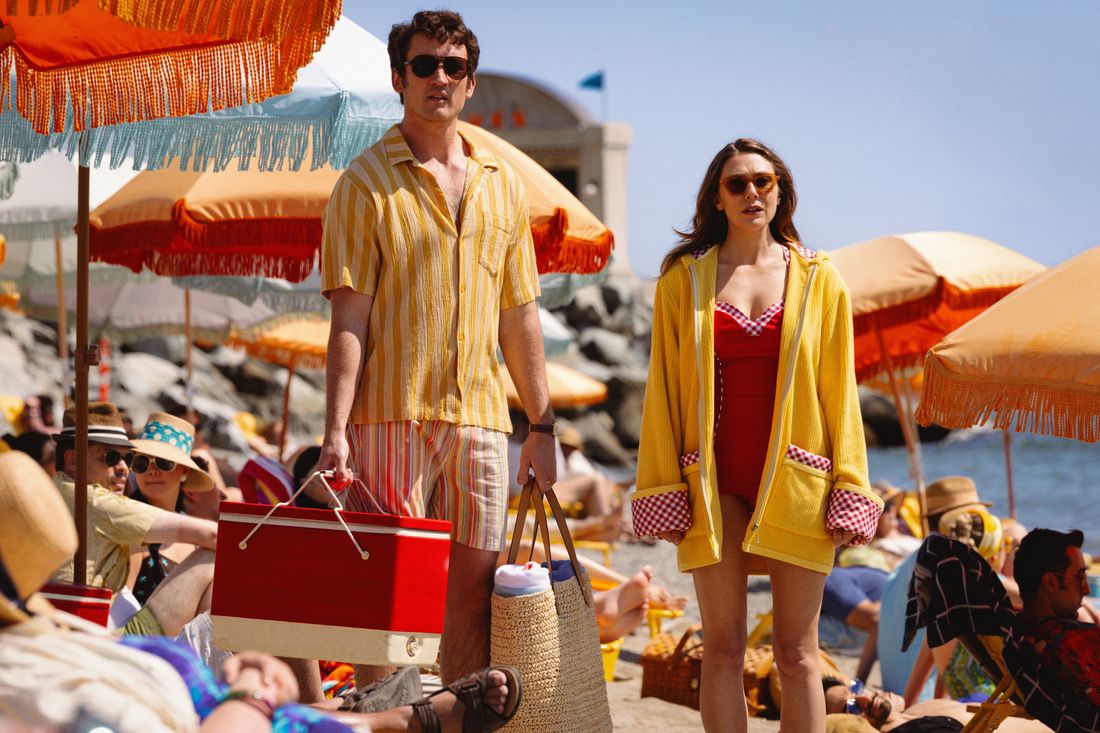
Several great films explore what happens after death, like Albert Brooks’s Defending Your Life, Michael Powell’s A Matter of Life and Death, Hirokazu Kore-eda’s After Life, and Ernst Lubitsch’s Heaven Can Wait. While Eternity doesn’t quite reach those heights, director David Freyne and co-writer Pat Cunnane deserve praise for their ambitious scope. They’ve created a detailed vision of the afterlife to serve as the backdrop for what is essentially a simple romantic comedy. Though, that ambition also comes with a downside. The afterlife they’ve imagined is so overly detailed that it’s hard not to question its logic.
The film Eternity takes place in the afterlife, where people who have just died get to choose how they’ll spend forever. They arrive at a massive, bustling train station that serves as a gateway to different worlds. Each person is paired with an ‘afterlife coordinator’ who helps them pick their eternal destination. This place, called the Junction, is like a huge convention center, with various worlds being promoted through displays and booths. There’s everything from Nudist World and Mountain World to a retro Studio 54 World and even a Smoker’s World (where cigarettes don’t pose a health risk). The popular Man-Free World is already full! (Part of the fun of the movie is spotting all the unique and imaginative worlds.) When Larry Cutler arrives, he’s slow to choose. He knows his wife, Joan, was also very ill and will likely arrive soon. You can bring a loved one with you to any world, but once you both make a decision, it’s permanent. If that feels a bit limiting for an eternity of happiness, perhaps you should discuss it with the filmmakers.
As expected, Joan (Elizabeth Olsen) shows up quickly, but there’s a twist: Luke (Callum Turner), the bartender at Eternity, is actually Joan’s first husband, who was presumed dead after serving in the Korean War. He’s been waiting for her in this timeless place for years, and Joan still has feelings for him. Now she faces a difficult choice: stay with her current husband, Larry, or reunite with the husband she thought she’d lost forever, who has patiently waited decades for her return? (Just so you know, in Eternity, people are reborn as the age they were happiest. This might raise some questions about how everything works, but it’s best not to dwell on it.)
While Eternity aims for simplicity, its complex concept ends up making it confusing. The film’s central problem isn’t about what the main character wants, but about the strange and restrictive rules of its invented afterlife. These many choices feel more oppressive than freeing, turning a story about the joys of commitment into something that feels like a punishment. This could have been an interesting idea if it were handled with more intention. It seems like a lot of effort went into the details of the world, but not enough into the story’s overall meaning or visual appeal. We’re told this isn’t heaven, but that doesn’t excuse how dull and lifeless it looks. Afterlife movies are usually visually imaginative, but Eternity is disappointingly ordinary.
The actors give it their all, which is a major plus, even if the film’s attempt to portray Miles Teller as the awkward underdog and Callum Turner as the confident, attractive one isn’t entirely convincing, as the actors look quite similar. However, Teller’s nervous energy nicely complements Turner’s brooding intensity. John Early and Da’Vine Joy Randolph clearly enjoy their roles as supporting characters. Most importantly, Elizabeth Olsen brings real depth and vulnerability to Joan’s indecision, making her struggle feel authentic. By the time she makes her heartbreaking decision, Olsen’s performance is truly moving – she fully embodies the character’s emotions. It’s a shame the movie itself doesn’t share her dedication.
Read More
- All Golden Ball Locations in Yakuza Kiwami 3 & Dark Ties
- NBA 2K26 Season 5 Adds College Themed Content
- What time is the Single’s Inferno Season 5 reunion on Netflix?
- Hollywood is using “bounty hunters” to track AI companies misusing IP
- Brent Oil Forecast
- Mario Tennis Fever Review: Game, Set, Match
- Heated Rivalry Adapts the Book’s Sex Scenes Beat by Beat
- BREAKING: Paramount Counters Netflix With $108B Hostile Takeover Bid for Warner Bros. Discovery
- EUR INR PREDICTION
- All Itzaland Animal Locations in Infinity Nikki
2025-11-26 20:57